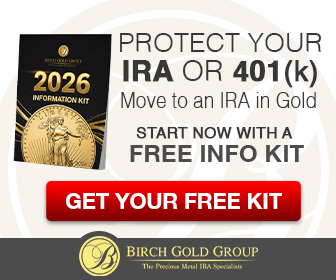401(k) to Gold IRA: **Transitioning 401(k) Funds into a Gold-Backed IRA**
*As an enthusiast and scholar around Gold IRA retirement planning, I am excited to share valuable insights on transitioning 401(k) funds into a gold-backed Individual Retirement Account (IRA). Retirement planning is a crucial aspect of financial stability, and exploring the unique attributes of a Gold IRA can be a great way to better plan for retirement.* Remember, this article is not a substitute for financial or tax advice. Gold backed IRAs have unique attributes that differ from traditional employer 401(k) plans and may perform differently. Always consult with a professional advisor before transitioning any portion of a 401(k) plan into a Gold IRA.
I. Introduction
Retirement is an inevitable phase of life, and financial preparedness is key to enjoying a stress-free post-employment period. Traditionally, 401(k) plans have been popular investment vehicles for retirement savings. However, the concept of a Gold IRA has gained significant attention in recent years due to its unique attributes and traditional ability to act as a store of value during economic uncertainties.
II. Understanding 401(k) and Gold IRAs
**What is a 401(k)?**
A 401(k) is a retirement savings plan sponsored by employers, allowing employees to set aside a portion of their pre-tax income for retirement. These plans often include employer-matching contributions, making them an attractive option for retirement savings.
**Introducing Gold IRAs and their Benefits**
A Gold IRA, also known as a Precious Metals IRA, is a self-directed retirement account that allows investors to hold physical precious metals like gold, silver, platinum, and palladium. The appeal lies in the longstanding inherent value and stability of precious metals, making them a potential hedge against economic downturns.
**Key Differences between Traditional IRAs and Gold IRAs**
Gold IRAs differ from traditional IRAs, which typically consist of paper assets like stocks, bonds, and mutual funds. Gold IRAs, on the other hand, hold tangible assets, offering unique diversification benefits for investors seeking to manage overall risk during times of market volatility.
III. Reasons Investors Have Transitioned to a Gold-Backed IRA
**Diversification and Risk Management**
While traditional investment portfolios are strongly correlated to market fluctuations, diversifying with gold can help manage overall portfolio risk because gold is not as correlated to the market and has acted as a store of value during turbulent times. Gold’s historical performance as a store of value demonstrates its ability to manage portfolio risk when other asset classes are more volatile.
**Hedge against Inflation and Economic Uncertainties**
Inflation erodes the purchasing power of fiat currency, but gold has shown resilience in maintaining value over the long term. Including gold in an otherwise diverse retirement portfolio can act as a hedge against inflation in times of economic uncertainties.
**Long-Term Store of Value**
Gold has withstood the test of time as a valuable commodity. By incorporating gold into an IRA as part of an otherwise diverse retirement strategy, individuals can add an asset with traditionally long term value, giving their retirement savings a layer of insulation through the years.
IV. How to Transition from 401(k) to Gold IRA
**Employer-Sponsored 401(k) Rollover Options**
When leaving a job or retiring, individuals have the option to roll over a portion of their 401(k) into a Gold IRA without incurring tax penalties. Understanding rollover options and custodian requirements is essential to ensure a seamless transition.
**The Process of Setting up a Gold IRA**
Setting up a Gold IRA involves selecting a reputable custodian and opening a self-directed IRA account. Investors can then fund the account and work with the custodian to purchase IRS-approved precious metals for their portfolio.
**Choosing a Reputable Custodian**
Selecting the right custodian is crucial for a successful Gold IRA transition. A reputable custodian will provide guidance, facilitate the buying and storing of precious metals, and comply with IRS regulations.
V. Factors to Consider Before Making the Transition
**Assessing Personal Financial Goals**
Before transitioning to a Gold IRA, individuals should evaluate their financial goals, risk tolerance, and time horizon. Considering individual circumstances will help tailor an investment strategy that aligns with retirement objectives. Always talk to a financial advisor.
**Tax Implications and Potential Penalties**
It’s essential to understand the tax implications of a 401(k) rollover and potential penalties for non-compliance. Seeking advice from tax professionals can ensure a smooth and tax-efficient transition.
**Evaluating the Gold Market**
Like any investment, the gold market can experience fluctuations. Researching market trends and consulting with experts can help investors make informed decisions about their gold holdings.
VI. Best Practices for Investing in Gold IRAs
**Researching and Selecting the Right Gold Assets**
Investors have various options when it comes to purchasing gold for their IRAs. Conducting thorough research and selecting high-quality gold assets can affect the performance of the overall retirement portfolio.
**Balancing Gold Allocation with Other Investments**
Achieving a balanced investment portfolio is crucial for risk management. Allocating an appropriate percentage of the IRA to gold while diversifying with other assets is the way wise investors over time have managed risk.
**Regular Portfolio Review and Adjustments**
The financial landscape is ever-changing, and periodic review of the Gold IRA portfolio is essential. Making adjustments as needed based on market conditions and individual goals ensures the portfolio remains on track.
VII. Addressing Common Misconceptions and Concerns
**Addressing Skepticism around Gold IRAs**
Despite the advantages, some individuals may remain skeptical about investing in gold. Addressing common doubts and providing factual information can dispel misconceptions and encourage informed decision-making. However, gold may not be the right asset class for you, and you should consult with an advisor to discuss your individual needs.
**Debunking Myths about Investing in Gold**
Misinformation about gold investments can deter potential investors. Clearing up myths and presenting accurate data can build confidence in the viability of Gold IRAs, though they may not be the right asset class for you depending on your particular goals.
**Clarifying Misconceptions about IRA Rollovers**
Misunderstandings about the rollover process may hinder individuals from transitioning their 401(k) funds to a Gold IRA. Clear and concise explanations can ease apprehensions and encourage action.
VIII. The Advantages of Professional Financial Guidance
**Seeking Advice from Certified Financial Planners**
Navigating the complexities of retirement planning and investing in precious metals can be daunting. Seeking guidance from certified financial planners can provide personalized strategies aligned with specific financial goals.
**Tailoring Investment Strategies to Individual Needs**
Every investor’s situation is unique, necessitating tailored investment strategies. Financial advisors can assess risk tolerance, time horizons, and other factors to create customized plans for a successful transition.
**Staying Informed about Market Trends**
Financial markets evolve, and staying informed is vital. Regularly engaging with financial advisors and staying updated on market trends can help individuals adapt their Gold IRA strategies.
IX. The Future of Gold and Retirement Planning
**Predictions for the Gold Market**
While it is impossible to predict the future with certainty, analyzing past trends and economic indicators can provide insights into the potential performance of gold as an investment in the years to come. That being said, past performance does not guarantee future results, and simply because gold has been a steady asset class throughout history does not guarantee that will continue into the future. Further, other precious metals such as silver may be more volatile despite being less expensive, while others like platinum and palladium are very expensive and may not be the best fit for the average gold IRA investor.
**How Gold Fits into Long-Term Retirement Planning**
As a traditionally long-term store of value, gold’s role in retirement planning has been a significant one for wise investors. Understanding this dynamic will help individuals appreciate the importance of a diversified and balanced portfolio that may include gold and other precious metals.
**Adapting Strategies Based on Economic Changes**
Economic landscapes are dynamic and subject to change. Flexibility in investment strategies and the ability to adapt to economic changes are essential for ensuring a secure retirement.
X. Conclusion
Transitioning a portion of 401(k) funds into a gold-backed IRA can be a prudent and strategic move for individuals seeking to diversify their retirement savings. Gold’s unique qualities, coupled with its historical performance, have made it an attractive asset for diversification. By carefully considering personal financial goals, seeking professional advice, and staying informed about the gold market, investors can make informed decisions that could positively impact their retirement journey.
As you embark on this exciting transition, remember that preparing for retirement requires careful planning and a commitment to staying informed. With a well-thought-out strategy that may or may not include a Gold IRA, you can approach your golden years with confidence and financial security.
FAQs – Transitioning 401(k) to Gold IRA
**1. Is a Gold IRA a safe investment for retirement?**
– Gold IRAs have traditionally performed steadily even in times of economic uncertainty. However, like any investment, it comes with its own set of risks that investors should carefully consider. Losses can occur and past performance is not indicative of future success.
**2. What are the tax implications of rolling over a 401(k) to a Gold IRA?**
– Rolling over a portion of your 401(k) into a Gold IRA can be tax-free if done correctly. It’s crucial to follow IRS guidelines and seek professional advice to ensure compliance and avoid unnecessary taxes or penalties.
**3. Can I hold other assets in my Gold IRA besides gold?**
– Yes, you can include other precious metals like silver, platinum, and palladium in your Gold IRA. Additionally, some custodians may allow for certain gold-related investments.
**4. How much of my retirement portfolio should be allocated to gold?**
– The allocation of gold in a retirement portfolio depends on individual goals, risk tolerance, and market conditions. A financial advisor can help determine the appropriate allocation for your specific situation.
**5. Should I consider a Gold IRA even if I already have a diversified investment portfolio?**
– While a Gold IRA can complement a diversified investment portfolio by providing an extra layer of diversification and a potential hedge against economic uncertainties, it depends on your individual goals, risk tolerance, and market conditions. A financial advisor can help determine if a Gold IRA is right for you.
*Please note that the information provided in this article is for educational and informational purposes only. It should not be construed as financial or investment advice. Individuals considering a Gold IRA should consult with certified financial professionals to make well-informed decisions based on their unique circumstances.*









Comments are closed.